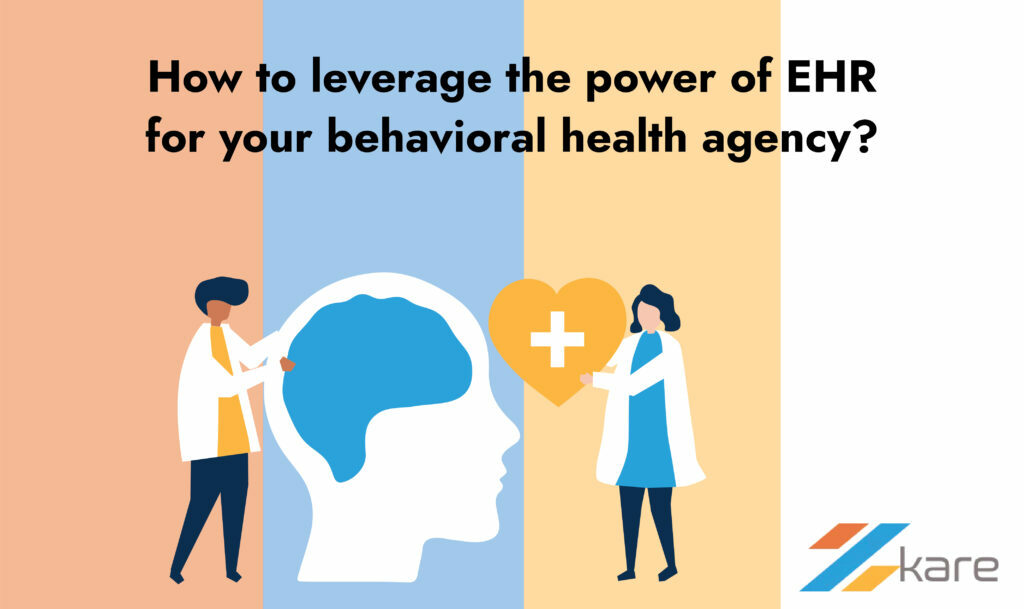
Behavioral Health
For a long time, the suitability of EHR for behavioral health services was doubted due to their specific needs. However, advanced EHR systems have made it possible for behavioral health providers to incorporate these solutions and optimize their operations seamlessly. Continue reading to see how behavioral providers use EHR to provide quality care and support to clients.
What steps can be taken to monitor behavioral health in electronic health records accurately?
EHR for behavioral health services is useful in taking over operational and administrative responsibilities from providers and enabling them to access clients’ longitudinal health data, which are essential for improving healthcare quality. Providers can simplify documentation and data records by integrating an effective EHR for behavioral health.
Given the numerous advantages of EHR systems throughout the behavioral healthcare industry, providers are increasingly looking for specialized behavioral health EHR solutions to enhance the quality of care provided to their clients.
Here are a few ways that EHR for
behavioral health allows providers to collect data and efficiently enhance client care coordination.
Easy to review and update records
Clients are often examined in a variety of settings. Each client’s physical behaviors and findings can consist of prescription updates, one-on-one or group counseling sessions, and other sensitive client care data. Implementing an EHR allows client records and progress notes to be easily reviewed and updated.
Convenient reminders and notifications
Implementing an EHR will notify providers electronically about approaching deadlines for sensitive client progress documents. Additionally, they can receive alerts when important dates, including meetings and consultations, are approaching.
Decreased archival needs
If your documents and records are stored in an EHR, you can remove filing cabinets from your office. When necessary, staff members can immediately access sensitive client data uploaded to a secure server in an EHR.
Increased efficiency
Using an EHR system would make billing more accurate because less time is needed to designate costs, which will reduce the amount of time staff members spend transcribing client information and submitting insurance claims.
Improved accuracy
An EHR enhances accuracy through clear and understandable orders and data, unlike the illegible handwriting in handwritten client records.
Better communication
Real-time access to clients’ records is provided to all staff members, enhancing integration and improving the quality of care. Implementing a behavioral healthcare EHR provides accurate and easy communication among clinicians.
An EHR can lead to better patient flow, decreased unnecessary tests, and quick answers to clients’ queries. Electronic health records enable providers and other healthcare professionals to access their client’s records anytime, anywhere.
What challenges does behavioral health face for EHR implementation?
While implementing an EHR in behavioral healthcare has many advantages, there are also certain drawbacks and concerns to be aware of. The following are a few challenges worth addressing that impede the use of EHR for behavioral health:
Data privacy concern
Given the complex nature of medical healthcare services, providers must protect the security and privacy of sensitive clients’ data. Additionally, severe laws like HIPAA require complete confidentiality of healthcare data.
To create an EHR that adheres to the strict standards governing the healthcare industry, providers must work with experienced behavioral health EHR vendors. Any EHR system being considered for implementation should have strong safety safeguards and be certified to adhere to all applicable local, state, and federal laws.
Usability hurdles
For a considerable period, the effectiveness of EHR systems in behavioral healthcare practices was seen in doubt, primarily due to the high demand for advanced data sharing, integrated care management, and data exchange capabilities, which are crucial in behavioral healthcare. Even now, the ideal solution for behavioral healthcare providers is to use customized or dedicated EHR systems that meet their specific needs.
Get started with a behavioral health EHR
Electronic health records help providers streamline their operations so they may focus more on interacting with clients and less time on tedious administrative activities. Although the field has taken longer than expected to adopt EHRs, now is a great opportunity for practices to jump in and get going. By providing exceptional features, behavioral health EHRs assist providers in meeting the demands of today’s clients.
Connect with us to learn more about Zkare behavioral health EHR solutions and take the first step towards a cutting-edge approach to behavioral health care.